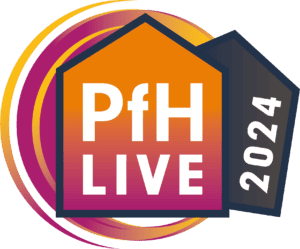PfH Live 2024: must-know highlights and top take-aways
This year’s PfH Live was our busiest ever. Taking place at Housing 2024, Europe’s largest housing festival, it was standing room only as nearly 600 people listened to a jam-packed schedule of expert speakers sharing industry intelligence, tips and guidance.
Our themes this year were Building Healthier Homes and Communities, Mastering Procurement and Compliance, and Driving Sustainability. Not only did visitors gain insights from speakers on all three topics, but there were heaps of opportunities to build valuable connections with PfH suppliers and share experiences with fellow PfH members.
We also hosted a Switch-Off Hour drinks reception at the end of day one, sponsored by Social Telecoms, where visitors were able to network and unwind.
If you missed PfH Live or just a particular session, we’ve pulled together this summary, so you’re equipped with the key take-aways.
Awaab’s Law: How do we ensure and maintain Legal and Regulatory Compliance?
Baljit Basra, from Devonshires Solicitors updated visitors on progress around Awaab’s Law and what it will mean for housing providers.
Key take-aways
- Government consultation on Awaab’s Law set out seven proposals for remedying hazards.
- Upcoming related changes to look out for:
- Housing Ombudsman Service being strengthened through Social Housing Regulation Act. More here.
- Review of the Housing Health and Safety Rating System (HHSRS). More here.
- Guidance on ‘Understanding and addressing the health risks of damp and mould in the home’ here.
- Consumer Standards and Tenant Satisfaction Measures and how they will relate to mould and damp repairs and complaints. More here.
Listen to more on Baljit Basra’s insights here.
Our new energy system and Zero Bills
Octopus Energy’s Nigel Banks outlined the future of energy systems with Zero Bills. He put a particular focus on ensuring no one is left behind, especially the most vulnerable.
Key take-aways?
- Fascinating breakdown of energy bills today in a typical existing home.
- The huge impact that changing gas prices, electricity prices and different tariffs are having on bills.
- Octopus Energy combine heat pump, battery and solar to eliminate bills. Their goal is to optimise imports and exports via smart control of the home system.
- 1,000 Zero Bills homes have now been accredited and they have partnerships across the housing industry.
- No longer ‘Fabric First’ but ‘Fabric Fifth’! Heat pumps, Smart tariffs and controls, Measurement of energy use, Solar and storage should all come before major fabric measures. More here.
See Nigel’s presentation here.
Practically preparing for the Procurement Act, for Buyers and Suppliers
Guy Stapleford, head of consultancy services at PfH outlined the timeline for reform plus some practical preparations social landlords can make.
Key take-aways
Guy advised social housing buyers to:
- Assign a business lead around procurement reform.
- Access the Government’s learning and development materials.
- Strike a balance between improved flexibility and transparency.
- Invest in learning and development for teams.
- Put the right governance in place.
- Assess resource implications.
- Change systems and processes where needed.
He also provided tips for suppliers, which you can see here.
Healthy homes for a healthier ageing population
Jeremy Porteus from the Housing Learning and Improvement (LIN) Network outlined the relationship between good housing and good health and how joined up working is essential.
Key take-aways
- Housing providers must engage with local integrated care systems and hospital trusts.
- Develop strategic partnerships to support joint commissioning between housing and health.
- Harness health intelligence to better understand patients’ experience of using health and care services.
- Conduct a health equity audit of residents to better understand their health and wellbeing needs.
Find out more about Jeremy’s advice for housing providers here.
Practical updates for housing associations delivering MMC now
Building Better’s Trina Chakravarti chaired a frank discussion with Katie Gilmartin at Platform Housing, Paul Mullane from Halton Housing and Tony Woods at PfH.
Key take-aways
- Trina shared a finding from the State of MMC Delivery in Social Housing survey: only 7% of social housing completions were volumetric (Category 1) – though it’s this side of the sector that receives the most media scrutiny. The rest (93% of MMC completions) used panelised (Category 2) or panelised and non-structural assemblies (Category 2 & 5).
- Speakers said they’re seeing housing associations increasingly use a mix of MMC and traditional.
Listen to the full panel discussion here.
Get your Act together: a practical legal roll out guide to the Procurement Act 2023
Richard Brooks, partner at Anthony Collins Solicitors has become a regular at PfH Live, giving invaluable updates on public procurement law. This year was no different, with Richard outlining practical implications around the new legislation.
Key take-aways
- Feedback – this is where it often goes wrong. Think about how your process can produce efficient, high quality feedback for bidders.
- Is your feedback factually accurate about what was in bids?
- Does it relate to the award criteria?
- Does it use correct descriptive language – matching your scoring table?
- Exemptions: There are certain key contracts where the new rules don’t apply – get to know these:
- Subject-matter exempted contracts.
- Counterparty exempted contracts.
- Direct award justifications.
Richard also shared advice on transparency and the importance of soft market testing. Learn more here.*
*Richard has since advised that he may have inadvertently misled the audience on one small point in the Q&A section of his session about the expiry for existing DPS under the current PCR2015. This involved overlooking a small section of the Procurement Act 2023 (Commencement No. 3) Regulations 2024 at Regulation 5(4)(b)(ii) which has the effect of automatically making a DPS expire at the end of 27th October 2028. If you have any queries arising from the presentation, please do get in touch info@pfh.co.uk and we would be happy to pass this on to Richard.
Social value in procurement: It’s about time….
Professor Jo Meehan from Liverpool University’s Centre for Sustainable Business explored important issues around responsible procurement, namely why social value in public procurement doesn’t always live up to expectations.
Jo’s research identified that stories are increasingly used by suppliers in procurement tenders. Stories are seen to aid the humanisation and contextualisation of social value. But Jo warned that cherry picking positive stories may not be representative.
Key take-aways
Jo encouraged social landlords to consider:
- When are outcomes measured, by who and against what?
- Whose stories are told? And whose aren’t?
- How are participants involved, and when?
- Who controls the narrative of success – suppliers?
- Who is accountable over a longer time frame?
Discover more about Jo Meehan’s research here.
Transformative placemaking for thriving and healthy communities
Roumpini Perakaki from PRP Architects shared fascinating insights about urban design and community engagement strategies that build vibrant, inclusive neighbourhoods.
She outlined six tools to achieve effective placemaking and brought each one to life with real examples and practical ideas.
Key take-aways
- Understand place: look beyond the boundary line.
- Embed history and heritage: Include people’s identities and cultural values in the design.
- Work with the community: understand the people who will live and use this area, placemaking needs an identify
- Homes are working harder: create adaptable and vibrant places; where people feel valued and can flourish,
- Masterplanning takes time: Consider the stages of development, and meanwhile, create a sense of belonging,
- Post occupancy assessment is critical: listen, learn and revisit
- Forward thinking: guidelines and codes are vital but design competition and feedback support change
Listen to Roumpini’s presentation here.
Decarbonisation: Setting your initial strategy
Connor Dalton, director of ESG, sustainability, health and safety at CEF shared tips for developing a decarbonisation plan, building momentum and keeping it a business priority.
Key take-aways
- Define the ‘what’ and ‘why’, particularly thinking about, drivers and challenges.
- Identify the ‘who’ – identify, analyse and prioritise stakeholders.
- Where are we now? Develop ideas for collecting footprint data around scopes 1, 2 & 3.
- Where do you want to get to? Consider Government targets, along with your own.
- How do you get there? Conor explained a seven-stage process to creating a strategy.
Find out more about Connor’s presentation here.
We hope you found this PfH Live round up useful, and we’d love to hear your thoughts on the sessions. Which was your favourite? What would you like to see more of next year? Get in touch at info@pfh.co.uk.





